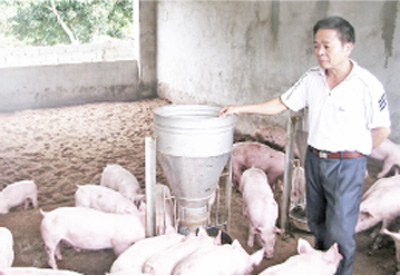
LIFSAP conducted by the Ministry of Agriculture and Rural Development (MARD) which aims to promote clean livestock from farm to table has so far yielded in positive results, proving a perfect solution for domestic livestock farmers.
 |
| Pig raising models based on VietGAP techniques have helped reduce environmental pollution |
The World Bank-financed Livestock Competitiveness and Food Safety Project (LIFSAP) conducted by the Ministry of Agriculture and Rural Development (MARD) which aims to promote clean livestock from farm to table has so far yielded in positive results, proving a perfect solution for domestic livestock farmers.
The project was kicked off on March 10, 2010 and is scheduled to end this year, attracting more than 11,000 farming households in 49 livestock farming areas located in Hanoi, Thai Binh, Hung Yen, Hai Duong, Hai Phong, Cao Bang, Thanh Hoa, Nghe An, Lam Dong, Dong Nai, Ho Chi Minh City and Long An.
According to LIFSAP Project Director Ton That Son Phong, over the past more than five years of implementation of the project, pig raising, according to the Vietnamese Good Agricultural Practices (VietGAP), has been piloted for the first time and yielded positive results, including decreasing mortality rate from 15 to 1 percent from the second breeding and shortening the breeding time from 135 to 118 days.
Pig raising helped farmers increase breeding efficiency by more than double compared with conventional raising, 20 and 8 percent respectively. When hog prices fell to VND38,000 per kg, pig raisers using VietGAP techniques still registered nearly VND40 million in annual profit, while conventional pig raisers will suffer from losses or remain profitless.
In addition to 11,000 supported farming households, more than 4,000 other households voluntarily registered for being enrolled in VietGAP farmer groups set up under the project, with the intention of improving productivity, product quality, competitiveness and the environment.
Recognizing the initial positive results of the project, the government and the World Bank agreed to extend it until 2018 with a supplemental loan of US$44.68 million. The project will in the coming time focus on supporting VietGAP farming groups to set up cooperatives, production planning, marketing and branding.
Under the project, more than 11,000 farming households have applied VietGAP techniques in pig raising models. With current average hog price of VND46,000 per kg, these farming households may earn VND498 billion annually, a VND298 billion increase over conventional pig farmer earnings
(Source:VEN)





